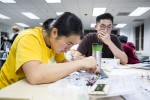Teams of engineering and computer science students huddled together over their computers while trying to program Arduinos on Wednesday night.
Organized and funded by Thales, an aerospace defense company, the Arduino Workshop challenge provided Arduinos for 24 students to program in teams and prepare for a larger international competition.
An Arduino is a microcontroller, or a tiny computer, that you can program to create new applications for consumers and businesses, said Joshua Sanchez, resourcing coordinator for Thales.
At the workshop, 17 students from UCLA and seven students from the California Institute of Technology were arranged into teams based on their majors. Each team of students has two weeks to create a viable project using Arduinos, with the winning team moving onto an international competition.
Projects from last year’s international competition included a helmet for soldiers that used an Arduino to monitor body heat as well as an automated water cannon controlled by an Arduino. Participants in the UCLA competition are encouraged to be equally creative, said Emily Feliz, senior communications coordinator for Thales.
Jenny Chieu, a second-year electrical engineering student, said she started working with Arduinos after purchasing one over the summer. Chieu said she wanted to attend the workshop because she thinks Arduinos are fun to use and that they may apply to her future career as an engineer.
“I think it would be interesting to make instruments that scientists use for their experiments,” Chieu said.
This was the first time the invite-only workshop was held at UCLA. Out of 120 applicants for the competition, just 24 students were able to participate.
Sanchez said he thinks the appeal of Arduinos lies in their relative simplicity and cheap cost while still allowing for a broad range of functions. The specific units used in the workshop cost about $20.
Feliz said she hopes to inspire innovations in programming and technology through the workshop.
“This competition is a platform for engineers to combine an engineering mindset with a lens of creativity to springboard into new platforms and new technologies,” Feliz said.
At the end of the workshop, each team received their own Arduino kit consisting of instruction manuals, wiring and an Arduino.
The teams now have two weeks to create a product in one of Thales’ five domains: aerospace, space, defense, security and transportation. During that time, the teams are required to post video diaries of their progress on YouTube, tagged under #ThalesArduino. They are allowed to spend their own money on extra components and other add-ons as they see fit.
Competitors can also ask engineers at Thales for assistance with any questions they may have throughout the next two weeks.
At the end of the competition, there will be a showcase for the final products. The showcase, along with the video diaries, will be used to determine the winning team. Each member of the winning team will receive a $100 Amazon voucher.
Thales will then pick an overall winner between the UCLA teams and those from a similar competition at UC Irvine. The winner of that face-off will be matched against two teams from the United Kingdom early next year for the final prize of a smartwatch chosen by a public vote on Thales’ website.
Though most of the teams have yet to form concrete plans for their projects, many students at the workshop said that they were excited about the work ahead.
